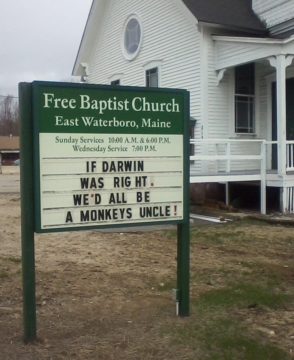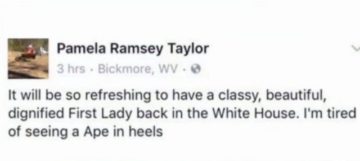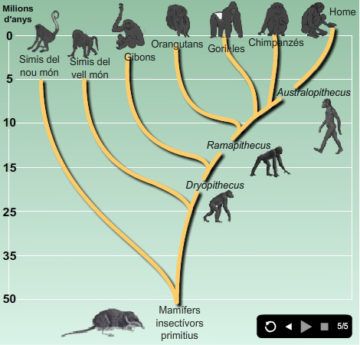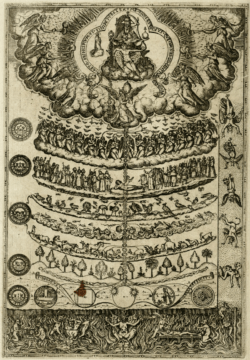by Mike Bendzela

“I am not an animal! I am a human being!”–“John” Merrick, The Elephant Man (1980 film)
“Das ist nicht nur nicht richtig; es ist nicht einmal falsch. [That is not only not right; it is not even wrong.]”–Attributed to Wolfgang Pauli
We get no traction on a problem until we develop a sound theory about it. Not a hypothesis or a hunch, but a theory, a true grasp of what a condition is and how it presents in society.
Imagine how horrible life must have been before we had a sound germ theory of disease. With no concept of viruses, amoebas, spirochetes, parasites, we floundered around with our hit-or-miss salves and poultices, herbs and concoctions, incantations and exorcisms. Ultimately, we just relapsed into fevers and sweats, berated continually with, “Well, you didn’t pray hard enough!”
No theory = no traction. It’s a disaster. Yet, somehow, our species managed to stumble through epochs of disaster. To evolve through it, even.
Such evolution was all but invisible to our ancestors, even though the signs were everywhere in our ancestral environments. We noticed that the war of nature persists non-stop. As a result, everything propagates apace — even unduly. Like begets like, yet variation is endemic. But the incremental ratcheting of species through time — that completely escaped us. We couldn’t know that our great grandmothers were primates and that the chimps are our cousins.
We know it now, though — in spades. But until we all incorporate these biological, universal truths into a fundamental world view, we are bound to continue “blowing and beating each other without mercy” [1] till Kingdom Come.
Ape savages Ape
Sometimes it’s pretty clear that our mind’s not right. Way back in the late fall of 2016, at the onset of the current Dark Age, this Facebook post appeared (as written):

Its offensiveness aside, the writer’s last statement is trivially true. It’s not right for her to say such a thing, but she’s not exactly wrong, either. Linguists, studying sentence grammar and its meaning, speak of “pragmatics,” the study of utterances in context. A sentence’s literal meaning may be at odds with the speaker’s intentions. The original claim — the meaning of the sentence, “I’m tired of seeing a Ape in heels” — is that the writer disapproves of the previous First Lady, whom she describes as a species of primate who sometimes wore high heels.
We all know what this writer intends — to demean Mrs. Obama. The writer wishes to announce her allegiance to the new regime through a concomitant degradation of the former one. She is saying, in effect, “Melania is not such a Ape as Michelle. I’m not a Ape, neither. I may wear heels, but I ain’t a Ape.”
It’s a racist statement, despite the writer’s later incoherent disavowal (in Comic Sans, no less):
I am in no way, shape or form a racist, bigot or chauvinist. My post, bc it may be interpreted as racist (though NO WAY INTENDED TO BE), was referring to my personal opinion of the attractiveness, NOT the color of one’s skin.
Most readers took the sentence the way the writer intended and completely overlooked — no, were completely blind to — the truth embedded therein (albeit inadvertently). The words themselves articulate 150-plus years of hard scientific labor, culminating in a transformation of the way we view ourselves and our relationships to other animals.
The writer, too, is a Ape. And a savage one at that. That she cannot openly avow her racist intentions should give us heart: it means racists today don’t have the courage of their convictions. Her post (and the whole furor afterward) is addled — not for its trivial truth but for the societal derangement necessary for a writer to successfully deploy a banal statement of biological truth to embody a savage grudge.
Imagine a gray squirrel berating a red squirrel thus: “Thou art a sciurid in furs!”
Imagine the marmot savaging the prairie dog with, “Thou art a rodent in burrows!”
It’s silly. But that’s basically what that Facebook post says. The whole approach is silly. But few get why. Few even want to get it.
It’s all the result of an obsolete view of the world, one that refuses to die.
Designed to be deceived
The people at Gallup (2019) tell us that belief in creationism is 40%, down seven points from twenty years ago, which seems like an improvement, until you consider that correct views about evolution are about half that: 22%. Still, that is up twelve points from twenty years ago.
But what about that other 38%? The Gallup pollsters phrase the beliefs of another 33% this way:
Human beings developed over millions of years, but God guided this process.

This isn’t the evolution by natural selection that Darwin espoused, it’s supernaturalism. The 33% who believe the “God-guided Hypothesis” are as misguided as the 40% who believe “God created man in His own image, in His image created He him.” God, apparently, just dawdled longer. (Perhaps the remaining 5% are just confused.)
So, to be clear: at least 73% of Americans are believers in varying degrees of creationism. To be part of the 22% who “believe” in natural selection, one must also believe in contemporary taxonomy — cladistics — which leads to the following syllogism:
All humans are great apes (Hominidae).
[Your Name goes here] is human.
Therefore, [Your Name] is a great ape.
This is a nested hierarchy, the phylogenetic tree of common descent. It is many-tiered but orderly, simple yet profound. And totally anti-biblical. It’s what makes that Facebook post trivially true. Yes, like the rest of us, Mrs. Obama is indeed a Ape. The great challenge for educators today is teaching all children, of all colors, to embrace their animal heritage.
In a course on evolution I took at my university, the syllabus contained this description of our line of descent (to which I’ve added the last two steps about great apes):
Chordates have a notochord and a dorsal, hollow nerve chord.
Craniates are chordates that have a head.
Vertebrates are chordates that have a backbone.
Gnathostomes are vertebrates that have jaws.
Tetrapods are gnathostomes that have limbs.
Amniotes are tetrapods that have a terrestrially adapted egg.
Mammals are amniotes that have hair and produce milk. [2]
[Great apes are mammals that have grasping hands and no tail.
Humans are great apes that have large, fucked-up brains and bipedal locomotion.]
Now, if we could only make this a catechism, if we could get children to chant it, we might avoid these continual linguistic and cognitive clusterfucks about race epitomized by that Facebook post.
Breaking the chains of savagery

The obsolete view — the one that refuses to die — is called the Great Chain of Being, or the Ladder of Nature (Scala Naturae). It comes down to us from the likes of Aristotle; grafts perfectly onto the Christian worldview with its sequential creation of “kinds” over six days, with man created last; and fouls the air to this day.
It’s the view that leads us to think of there being “higher” and “lower” organisms. It’s the view that exalts “man’s” “dominion” over other organisms. It’s the view that fosters savagery, for it permits a human to project her own animal nature onto another heel-wearing Ape.
Savagery entails losing sight of one’s animal nature. A person might think she subordinates another by calling her by her cladistic name, but she only debases herself in the process. She’s announcing her ignorance.
Darwin called this out early on in his career, before he formulated his theory. While sailing around the world on the Beagle, he got to hear “facts about slavery so revolting” that he would not have believed them had he heard them spoken about back in cushy England. After enumerating in his diary some of the atrocities that abounded abroad in the early 19th century, Darwin excoriates those who believe that the slaves don’t really want to be returned to their home countries.
He quotes one slave: “If I could but see my father & two sisters again, I should be happy. I can never forget them,” and then follows with this statement (bold mine):
Such was the expression of one of these people, who are ranked by the polished savages of England as hardly their brethren, even in Gods [sic] eyes.
That’s your boilerplate Great Chain of Being there, in that word “ranked.” Darwin recognized that, by being blind to their common descent with the Africans whom they enslaved, the English had become the rankest of savages, as it were.
And so, in this light, I offer the following historical utterance, spoken by the ex-alpha Ape of the United States, about Mexican immigrants:
“We have people coming into the country, or trying to come in — and we’re stopping a lot of them — but we’re taking people out of the country. You wouldn’t believe how bad these people are. These aren’t people. These are animals.”
After another predictable, wearying, depressing round of criticism and countercriticism of this immensely addled remark, Trump’s press secretary Sarah Huckabee Sanders had this to say by way of defense, only further mangling the “discussion” (bold mine):
“I don’t think the term the president used was strong enough. It took an animal to stab a man 100 times and decapitate him and cut his heart out. [Sanders refers to a gang killing that took place in Maryland in 2017.]”
I can imagine my mom (Barb) saying: “No shit, Dick Tracy,” which is what she would say to me whenever I played Captain Obvious.
We’re all animals, goddamnit! But it takes a special kind of animal to commit premeditated murder against another animal so savagely, namely a human one. You won’t find a squirrel doing it, nor a prairie dog, nor yet most other species of ape. (Grasping hands or no, I can’t imagine our cousins, the chimps, knowing how to use a knife. They tend to rip each other apart with their bare hands).
Barb, my mother, is no Ape in heels: She’s in her 80s, has bad joints, and uses a walker. Heels are just out of the question.
Ain’t I a Ape?

Poor “John” Merrick, that fictionalized version of the elephant man, Joseph Merrick, quoted up top. He really couldn’t know what he was saying.
Although born after the publication of On the Origin of Species, Merrick shuffled along the earth before Darwin’s view really took hold.
When that crowd of well-dressed gawkers—“polished savages” all—converges on Merrick in the loo, imagine a more informed speech:
“You poor schmucks! What do think I am? A vegetable? A mineral?
“What am I, if not an animal? I eat, and I drink, doesn’t that make me an animal?
“I love, I cry, and I sleep, and aren’t I an animal?
“And you–Prick you, and you bleed. Chase you, corner you in the loo—you shit yourself in fear. Doesn’t that make you an animal?
“So, let’s be animals. Let’s just stop being savages.”
Again: it takes an animal to murder, decapitate and butcher another animal out of spite, but you won’t find a squirrel doing it.
No, only the goddamned son of Adam does that.
_________________________
Notes
[1] From Dream Song 46 by John Berryman – Famous poems, famous poets. – All Poetry
[2] The University of Southern Maine (2017). BIO 217: Evolution. Portland, Maine: Kenneth Weber.
Images
Church sign photo by the author.
“Primates evolution.” by AmadeuBlasco is licensed under CC BY-NC-ND 3.0.
1579 drawing of the Great Chain of Being from Didacus Valades, Rhetorica Christiana. Public Domain.
Joseph Merrick (1862-1890). This photograph was first published in The Elephant Man: A Study in Human Dignity by Ashley Montagu (first published in London and the United States in 1971; OCLC: 732266137). Public Domain.
